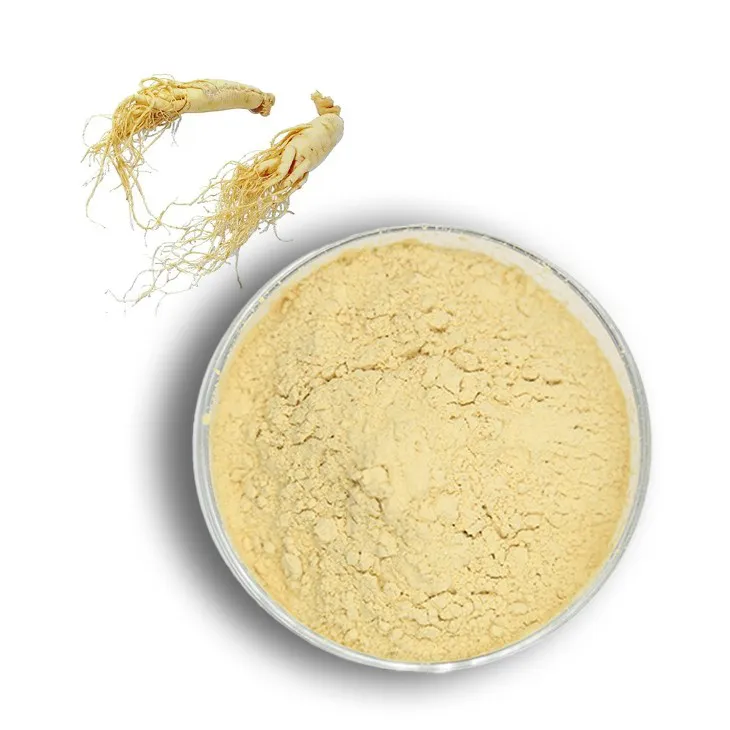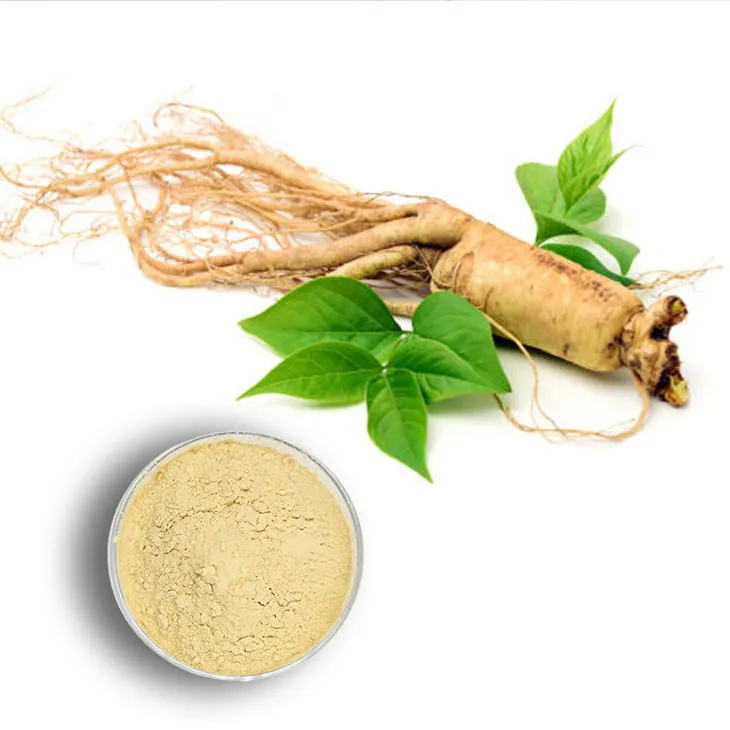- 0086-571-85302990
- sales@greenskybio.com
Is ginseng root extract beneficial for diabetes? Are these all safe and suitable for diabetic patients?
2024-11-14

1. Introduction
Diabetes has emerged as a significant global health concern, affecting millions of people. The search for natural remedies and supplements that can help manage diabetes has led to the exploration of various substances, and Ginseng Root Extract is one such candidate. Ginseng has a long history of use in traditional medicine systems, particularly in Asian cultures. But the question remains: is it truly beneficial for diabetes, and is it safe for diabetic patients? This article aims to comprehensively address these questions by examining the potential mechanisms, scientific research findings, and other relevant considerations.

2. Types of Ginseng
There are several types of ginseng, with the most commonly studied ones in relation to diabetes being Panax ginseng (Asian ginseng) and American ginseng.
2.1 Panax Ginseng
Panax ginseng is native to Asia and has been used in traditional Chinese medicine for centuries. It contains a variety of active compounds, such as ginsenosides, which are thought to be responsible for many of its pharmacological effects.
2.2 American Ginseng
American ginseng is mainly found in North America. It also contains ginsenosides, but the composition may differ slightly from that of Panax ginseng. These differences may potentially lead to variations in its effects on diabetes.

3. Potential Mechanisms of Action on Diabetes
Ginseng Root Extract may exert beneficial effects on diabetes through multiple mechanisms:
- Blood Glucose Regulation:
Some studies suggest that ginsenosides in ginseng can influence insulin secretion and sensitivity. For example, they may stimulate pancreatic beta - cells to secrete more insulin, thereby helping to lower blood glucose levels. Additionally, they may enhance the body's sensitivity to insulin, allowing cells to better uptake glucose from the bloodstream.
- Anti - Inflammatory Effects:
Chronic inflammation is associated with diabetes. Ginseng has been shown to possess anti - inflammatory properties. By reducing inflammation in the body, it may help to improve insulin resistance and overall glycemic control. The anti - inflammatory effects may be mediated through various pathways, such as inhibiting the production of inflammatory cytokines.
- Oxidative Stress Reduction:
Diabetes is often accompanied by increased oxidative stress. Ginseng contains antioxidants that can scavenge free radicals and reduce oxidative damage. This may protect pancreatic beta - cells from oxidative stress - induced damage, thus maintaining their normal function in insulin secretion.

4. Scientific Research Findings
Many scientific studies have been conducted to investigate the effects of Ginseng Root Extract on diabetes:
4.1 Animal Studies
- In diabetic animal models, such as rats with streptozotocin - induced diabetes, treatment with ginseng extract has been shown to improve blood glucose levels. For instance, some studies reported a significant decrease in fasting blood glucose levels after ginseng administration.
- Animal studies have also demonstrated that ginseng can improve lipid metabolism in diabetic animals. It may reduce triglyceride and cholesterol levels, which are often dysregulated in diabetes.
4.2 Human Studies
- Some small - scale human trials have suggested that ginseng supplementation can have a positive impact on glycemic control in diabetic patients. For example, in a short - term study, diabetic patients who took ginseng extract showed a modest reduction in HbA1c levels, a long - term marker of blood glucose control.
- However, the results of human studies are not entirely consistent. Larger and more long - term studies are needed to confirm the efficacy of ginseng in diabetes management. Some studies failed to show significant differences in blood glucose control between the ginseng - treated group and the placebo group.

5. Safety Considerations for Diabetic Patients
While ginseng root extract may show potential benefits for diabetes, safety is also a crucial aspect to consider:
- Interaction with Medications:
Diabetic patients are often on medications such as metformin or insulin. Ginseng may interact with these medications. For example, it may potentiate the hypoglycemic effects of insulin, increasing the risk of hypoglycemia (low blood sugar). Therefore, patients should be closely monitored if they decide to take ginseng while on diabetes medications.
- Allergic Reactions:
Some individuals may be allergic to ginseng. Allergic reactions can range from mild symptoms like skin rashes to more severe ones such as difficulty breathing. Diabetic patients should be cautious when starting ginseng supplementation and should discontinue use if any allergic symptoms occur.
- Quality and Purity of Supplements:
The market for ginseng supplements is vast, and the quality and purity can vary significantly. Low - quality or adulterated ginseng products may not only lack the expected beneficial effects but may also pose potential health risks. Diabetic patients should choose high - quality, reliable supplements from reputable sources.

6. Dosage and Administration
Determining the appropriate dosage of ginseng root extract for diabetic patients is complex:
- There is no standardized dosage for ginseng in diabetes treatment. In general, the dosage used in studies varies depending on the type of ginseng, the form of the extract (e.g., powder, capsule), and the study population.
- It is important to start with a low dose and gradually increase it while closely monitoring for any adverse effects. This is especially important for diabetic patients, given the potential interactions with medications and the risk of hypoglycemia.
7. Conclusion
In conclusion, ginseng root extract shows some potential in benefiting diabetes through various mechanisms such as blood glucose regulation, anti - inflammatory effects, and oxidative stress reduction. However, the scientific evidence from human studies is still not conclusive. Additionally, safety considerations, including potential interactions with medications, allergic reactions, and the quality of supplements, must be taken into account. Diabetic patients who are interested in using ginseng root extract should consult their healthcare providers before starting supplementation. With further research, a more definitive answer regarding the role of ginseng in diabetes management may be obtained.
FAQ:
Q1: How does ginseng root extract potentially benefit diabetes?
Ginseng root extract may have several potential benefits for diabetes. Some studies suggest that it can help improve insulin sensitivity. By enhancing the body's response to insulin, it may assist in better blood sugar regulation. Ginseng may also have antioxidant properties that can reduce oxidative stress in the body, which is often elevated in diabetic patients. Additionally, it might play a role in modulating certain metabolic pathways related to glucose metabolism.
Q2: Are there different types of ginseng root extract and do they all have the same effect on diabetes?
There are different types of ginseng, such as Asian ginseng (Panax ginseng) and American ginseng (Panax quinquefolius). While both types have shown some potential benefits for diabetes, they may not have exactly the same effects. Asian ginseng has been associated with enhancing energy and overall vitality, which could potentially impact diabetes management in terms of improving general well - being. American ginseng, on the other hand, has been more specifically studied for its effects on blood sugar levels and may have a more direct influence on post - meal blood glucose regulation.
Q3: What are the possible side effects of ginseng root extract for diabetic patients?
Although ginseng root extract may offer benefits, it can also have side effects. Some diabetic patients may experience a drop in blood sugar levels that is too rapid or too low (hypoglycemia), especially if they are taking other medications to control blood sugar. Ginseng may also interact with certain medications, such as blood - thinners or anti - platelet drugs, which could increase the risk of bleeding. In addition, some people may experience digestive issues like nausea, diarrhea, or stomach upset after taking ginseng root extract.
Q4: How should diabetic patients use ginseng root extract?
Diabetic patients should consult their healthcare provider before using ginseng root extract. If approved, they should start with a low dose and gradually increase it while closely monitoring their blood sugar levels. It's important to note that ginseng should not be used as a substitute for prescribed diabetes medications, but rather as a complementary approach. Also, it's crucial to ensure that the ginseng product is from a reliable source to avoid contaminants or incorrect labeling.
Q5: Is there enough scientific evidence to support the use of ginseng root extract for diabetes?
There is a growing body of scientific research on the potential benefits of ginseng root extract for diabetes. However, more research is still needed. Some studies have shown positive results in terms of blood sugar regulation, but the evidence is not yet conclusive. The mechanisms by which ginseng may affect diabetes are still being explored, and larger - scale, long - term studies are required to fully understand its efficacy and safety for diabetic patients.
Related literature
- The Effects of Ginseng on Diabetes Mellitus: A Systematic Review"
- "Ginseng and Diabetes: Current Research and Future Perspectives"
- "Potential Benefits of Ginseng Root Extract in Diabetic Patients: A Meta - Analysis"
- ▶ Hesperidin
- ▶ citrus bioflavonoids
- ▶ plant extract
- ▶ lycopene
- ▶ Diosmin
- ▶ Grape seed extract
- ▶ Sea buckthorn Juice Powder
- ▶ Beetroot powder
- ▶ Hops Extract
- ▶ Artichoke Extract
- ▶ Reishi mushroom extract
- ▶ Astaxanthin
- ▶ Green Tea Extract
- ▶ Curcumin Extract
- ▶ Horse Chestnut Extract
- ▶ Other Problems
- ▶ Boswellia Serrata Extract
- ▶ Resveratrol Extract
- ▶ Marigold Extract
- ▶ Grape Leaf Extract
- ▶ blog3
-
Cranberry Plants and Skin - care Products.
2024-11-14
-
Milk Thistle Extract
2024-11-14
-
Curcuma Longa Extract/Turmeric extract
2024-11-14
-
Boswellia Serrata Extract
2024-11-14
-
Hawthorn powder
2024-11-14
-
Feverfew Extract
2024-11-14
-
Uridine-5'-monophosphate Disodium salt
2024-11-14
-
Pine bark Extract Powder
2024-11-14
-
Red Vine Extract
2024-11-14
-
White mustard seed extract
2024-11-14
-
Propolis Extract Powder
2024-11-14





















